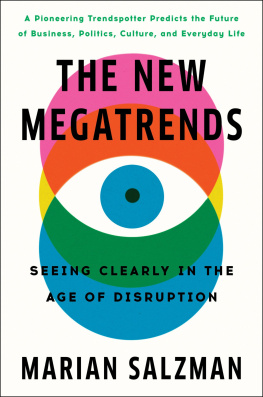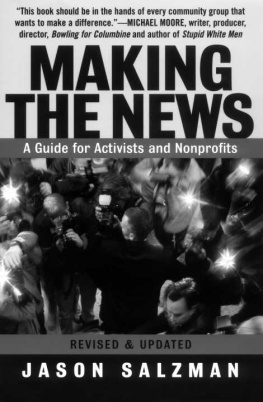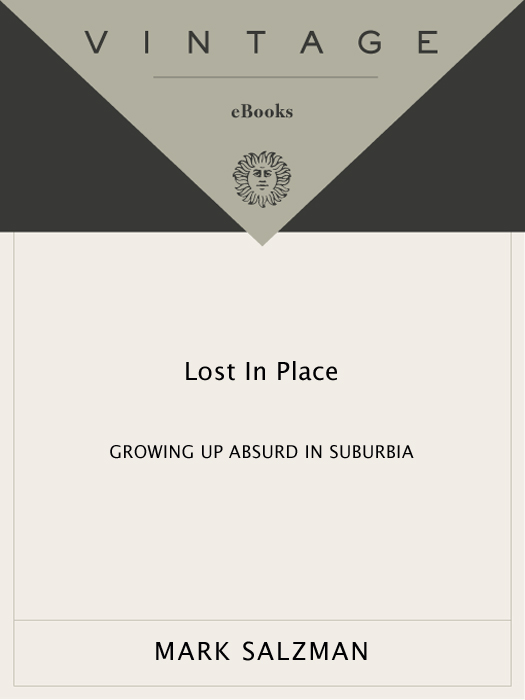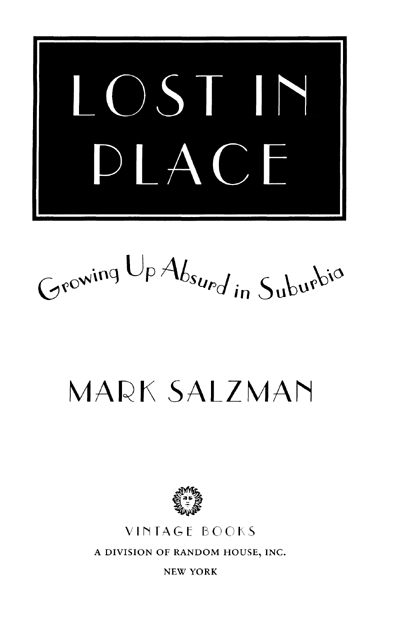ACCLAIM FOR MARK SALZMANs
LOST IN PLACE
Mark Salzmans strange but wonderful addiction to kung fu makes Lost in Place come alive.
The New York Times Book Review
Mark Salzman provides us with an entertaining memoir about growing up different in suburban Connecticut. He has produced a surprisingly funny and warm-hearted book.
Star Ledger (Newark, N.J.)
[Lost in Place] is funny and all of it is instructive, especially if you are a parent or a curious, idealistic teenager.
Detroit Free Press
Salzmans story is refreshing in depicting the small triumphs of middle-class life and how even a gifted guy had to struggle.
People
This memoir is funny and far off the beaten path.
Ann Arbor News
Mark Salzman has written a memoir of his youth that is extraordinary in its details and evocation of adolescent emotions.
Playboy
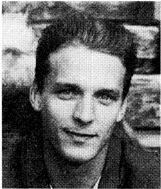
MARK SALZMAN
LOST IN PLACE
Mark Salzmans previous books include Iron & Silk, an account of the two years he spent in China teaching English and studying martial arts, and two novels, The Laughing Sutra and The Soloist, the latter a finalist for the Los Angeles Times Book Prize for Fiction. Mr. Salzman lives with his wife and their various animals in Los Angeles. Besides writing, he practices the cello every day in the hope that one day he will be able to play so well that his cats wont flee the room.
Though he enjoyed revisiting his past in this book, Mr. Salzman is grateful that so few photographs of him as a teenager survive.
BOOKS BY MARK SALZMAN
Iron & Silk
The Laughing Sutra
The Soloist
Lost in Place
FIRST VINTAGE BOOKS EDITION, JULY 1996
Copyright1995 by Mark Salzman
All rights reserved under International and Pan-American Copyright Conventions. Published in the United States by Vintage Books, a division of Random House, Inc., New York, and simultaneously in Canada by Random House of Canada Limited, Toronto. Originally published in hardcover by Random House, Inc., New York, in 1995.
Grateful acknowledgment is made to Alfred A. Knopf, Inc., and Gower Publishing Limited for permission to reprint excerpts from Tao Te Ching by Lao Tsu, translated by Gia-fu Feng and Jane English. Copyright 1972 by Gia-fu Feng and Jane English. Rights throughout the British Commonwealth are controlled by Gower Publishing Limited. Reprinted by permission of Alfred A. Knopf, Inc. and Gower Publishing Limited.
The Library of Congress has cataloged the
Random House edition as follows:
Salzman, Mark.
Lost in place / Mark Salzman.1st ed.
p. cm.
1. Salzman, MarkChildhood and youth.
2. Authors, American20th centuryBiography.
3. Ridgefield (Conn.: Town)Social life and customs.
I. Title.
PS3569.A4627Z473 1995
813.54dc20 95-7847
eISBN: 978-0-307-81426-5
Random House Web address: http://www.randomhouse.com/
v3.1
For Joseph Arthur Salzman,
artist, astronomer, social worker, beloved father
and good-natured pessimist, whose reaction to this
book was to say that he enjoyed it, but felt that my
portrayal of him was inaccurate. I put him, he
complained, in an excessively positive light.
Although this is a work of nonfiction and represents the whole, unsullied, objective truth, I am advised of the slim chance that some of the people described in this book might remember things differently. To accommodate that absurd possibility, all of the names except for those of my immediate family have been changed.
The world is a hell of a place, but the universe is a fine thing.
Edwin Arlington Robinson
It has been asserted that we are destined to know the dark beyond the stars before we comprehend the nature of our own journey but we also know that our inward destination lies somewhere a long way past the reef of the Sirens, who sang of knowledge but not of wisdom.
Loren Eiseley
Contents
1

W hen I was thirteen years old I saw my first kung fu movie, and before it ended I decided that the life of a wandering Zen monk was the life for me. I announced my willingness to leave East Ridge Junior High School immediately and give up all material things, but my parents did not share my enthusiasm. They made it clear that I was not to become a wandering Zen monk until I had finished high school. In the meantime I could practice kung fu and meditate down in the basement. So I immersed myself in the study of Chinese boxing and philosophy with the kind of dedication that is possible only when you dont yet have to make a living, when you are too young to drive and when you dont have a girlfriend.
First I turned our basement into what I thought a Buddhist temple should look like. I shoved all the junk to one side, marked off boundaries with candles and set up a shrine on a coffee table. I outfitted the shrine with objects from a cookware shop, the only store in town that carried Oriental gifts: a bamboo placemat, a package of chopsticks, a sake cup, which I turned into an incense burner, and a plastic Chinese kitchen deity with the character for tasty painted on his stomach. Next to the shrine I placed my sacred texts: the World Book Encyclopedia volumes containing entries for China, Buddhism and Taoism and Bruce Tegners book Kung Fu & Tai Chi, seventh in a series of manuals by Mr. Tegner, a crew-cut ex-marine and our countrys most prolific authority on hand-to-hand combat.
Back in those presmoke alarm days I was able to burn as much incense as I wanted, and as far as I was concerned a kung fu temple wasnt a kung fu temple if you could see more than five feet in front of you. Sadly, the only place in Ridgefield, Connecticut, where one could buy incense was a store called Ye Olde Head Shop, which specialized in black-light posters and rolling papers, and their incense display didnt feature traditional Asian scents like sandalwood or frankincense. Ye Olde Head Shop carried Apricot, Watermelon, Passion Fruit and something called Black Love, which came packaged in a long cardboard pouch illustrated with the silhouette of a naked man and woman, both with huge Afro haircuts, having sex. I did not dare ask the brooding hippie behind the counter for a pack of Black Love or even the more temperate-sounding Passion Fruit, so I stuck with the sexually neutral varieties, which did remind one of apricot and watermelon when you sniffed the box but as soon as you lit the cones smelled like burning cardboard.
There were other details. I needed an outfit for my training sessions, but the kung fu uniforms advertised in the martial arts magazines were too expensive. I settled on dyeing my green pajamas black, but the dye did not fix properly and my uniform came out an olive-purple. Tying it with my fathers red bathrobe sash, I looked like an eggplant wrapped for Christmas. Trickiest of all, however, was what to do about my hair. Real Zen masters shave their heads, as anyone who has watched the


